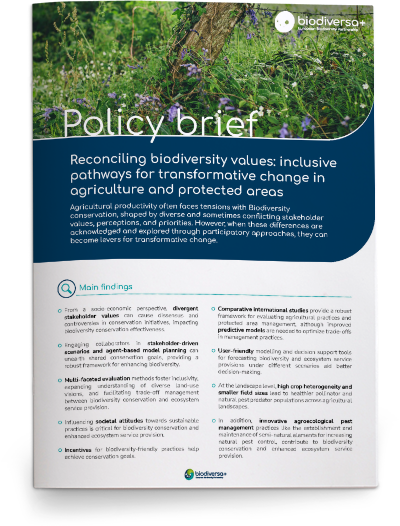Policy brief: “Reconciling biodiversity values: inclusive pathways for transformative change in agriculture and protected areas”
Biodiversity holds ecological, cultural, economic, and intrinsic value. However, these diverse perspectives are often poorly integrated into decision-making. Agricultural productivity often conflicts with biodiversity goals, where differing stakeholder values can lead to disagreements that undermine conservation efforts. Drawing on research from ENVISION, OBServ, and SECBIVIT, this brief offers recommendations for recognising, articulating, and reconciling multiple biodiversity values in policy and practice. Drawing on agriculture and land use examples, it shows how participatory scenario-building can bridge divergent stakeholder views by engaging farmers, conservationists, and local communities to co-design socially acceptable, locally adapted solutions balancing conservation and productivity.
Key takeaways include:
- Recognising value pluralism by basing decisions on a broad understanding of biodiversity values beyond economic metrics.
- Using deliberative processes to surface diverse perspectives and build consensus.
- Supporting interdisciplinary tools and knowledge by integrating social sciences and humanities insights to deepen value understanding.
- Tailoring valuation methods and embracing diverse data to reconcile differing perspectives in context.
Specific recommendations include:
- Building on international studies and developing predictive tools, enhancing modelling capacity to evaluate agricultural practices, support biodiversity and pollinator populations, and inform scenario-based planning.
- Promoting diverse, biodiversity-friendly farming systems by encouraging smallholder operations, crop heterogeneity, and reduced field sizes, and by integrating semi-natural habitatsto support pest control and ecosystem service provision.
- Strengthening education, extension services, and farmer-led innovation to raise environmental awareness, support the adoption of sustainable agroecological practices, and foster adaptive responses to changing conditions.
- Adopting flexible, evidence-based policy frameworks that incentivise biodiversity-positive practices, support pesticide reduction, and enable innovation in sustainable farming.




